Tourism Environment and Industry: A Case Study of Maldives
VerifiedAdded on 2023/06/07
|11
|2751
|275
AI Summary
This report provides an essay on different aspects of tourism, with Maldives as the concerned tourism destination. It includes a description of different types of stakeholders and their role in decision making, as well as micro and macro environment factors influencing the demand of tourism in the world.
Contribute Materials
Your contribution can guide someone’s learning journey. Share your
documents today.
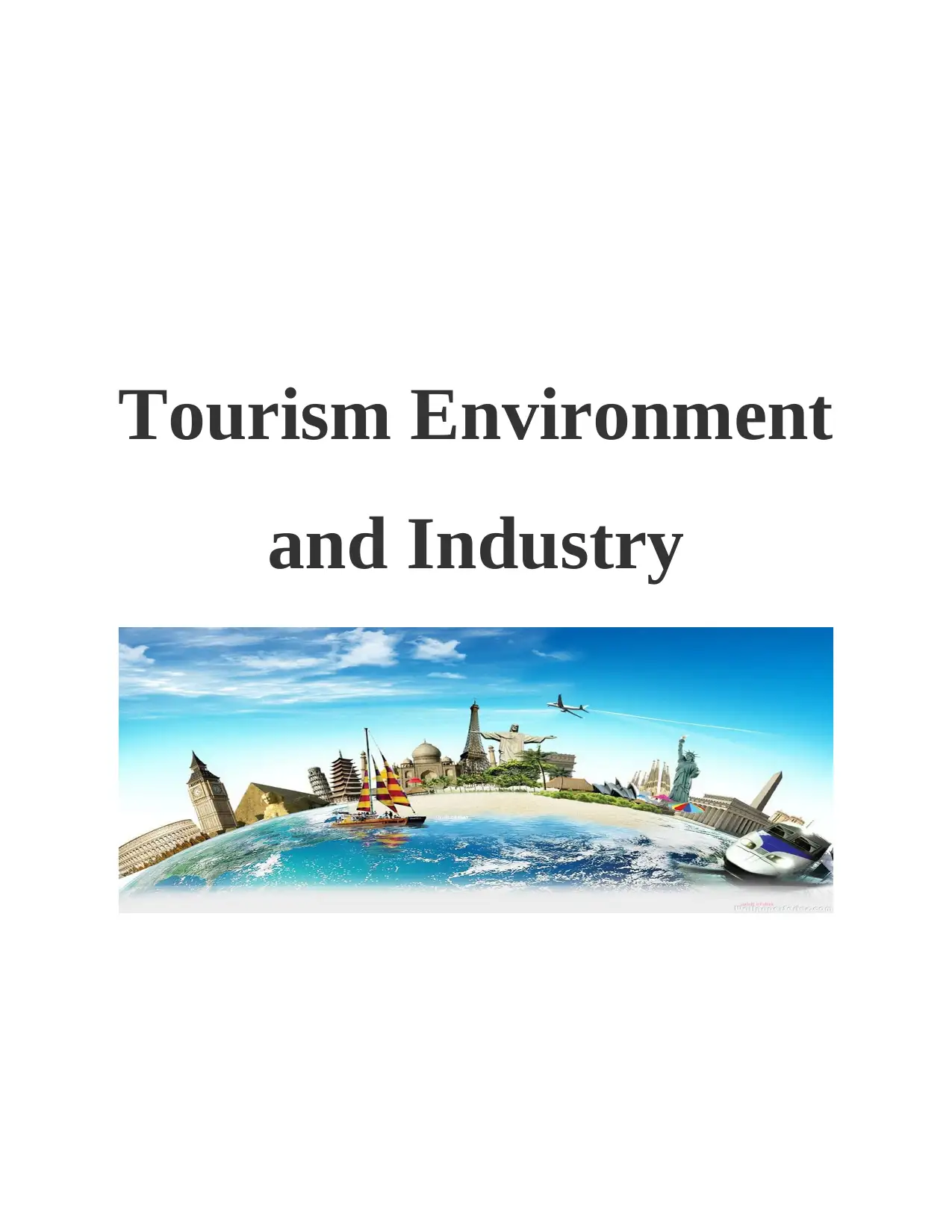
Tourism Environment
and Industry
and Industry
Secure Best Marks with AI Grader
Need help grading? Try our AI Grader for instant feedback on your assignments.

Contents
INTRODUCTIONs..........................................................................................................................1
Recommendations ...........................................................................................................................5
CONCLUSION ...............................................................................................................................5
REFERENCES................................................................................................................................7
INTRODUCTIONs..........................................................................................................................1
Recommendations ...........................................................................................................................5
CONCLUSION ...............................................................................................................................5
REFERENCES................................................................................................................................7
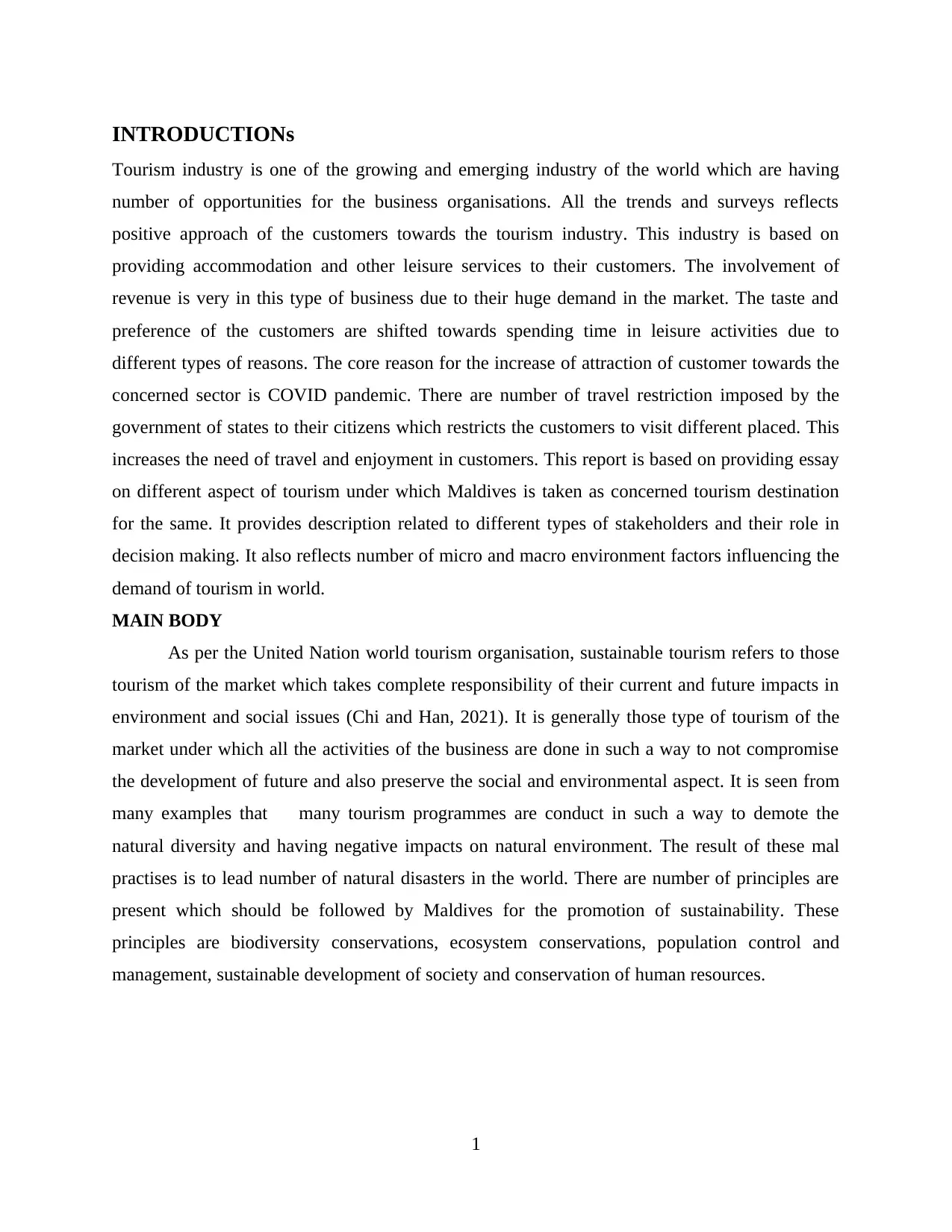
INTRODUCTIONs
Tourism industry is one of the growing and emerging industry of the world which are having
number of opportunities for the business organisations. All the trends and surveys reflects
positive approach of the customers towards the tourism industry. This industry is based on
providing accommodation and other leisure services to their customers. The involvement of
revenue is very in this type of business due to their huge demand in the market. The taste and
preference of the customers are shifted towards spending time in leisure activities due to
different types of reasons. The core reason for the increase of attraction of customer towards the
concerned sector is COVID pandemic. There are number of travel restriction imposed by the
government of states to their citizens which restricts the customers to visit different placed. This
increases the need of travel and enjoyment in customers. This report is based on providing essay
on different aspect of tourism under which Maldives is taken as concerned tourism destination
for the same. It provides description related to different types of stakeholders and their role in
decision making. It also reflects number of micro and macro environment factors influencing the
demand of tourism in world.
MAIN BODY
As per the United Nation world tourism organisation, sustainable tourism refers to those
tourism of the market which takes complete responsibility of their current and future impacts in
environment and social issues (Chi and Han, 2021). It is generally those type of tourism of the
market under which all the activities of the business are done in such a way to not compromise
the development of future and also preserve the social and environmental aspect. It is seen from
many examples that many tourism programmes are conduct in such a way to demote the
natural diversity and having negative impacts on natural environment. The result of these mal
practises is to lead number of natural disasters in the world. There are number of principles are
present which should be followed by Maldives for the promotion of sustainability. These
principles are biodiversity conservations, ecosystem conservations, population control and
management, sustainable development of society and conservation of human resources.
1
Tourism industry is one of the growing and emerging industry of the world which are having
number of opportunities for the business organisations. All the trends and surveys reflects
positive approach of the customers towards the tourism industry. This industry is based on
providing accommodation and other leisure services to their customers. The involvement of
revenue is very in this type of business due to their huge demand in the market. The taste and
preference of the customers are shifted towards spending time in leisure activities due to
different types of reasons. The core reason for the increase of attraction of customer towards the
concerned sector is COVID pandemic. There are number of travel restriction imposed by the
government of states to their citizens which restricts the customers to visit different placed. This
increases the need of travel and enjoyment in customers. This report is based on providing essay
on different aspect of tourism under which Maldives is taken as concerned tourism destination
for the same. It provides description related to different types of stakeholders and their role in
decision making. It also reflects number of micro and macro environment factors influencing the
demand of tourism in world.
MAIN BODY
As per the United Nation world tourism organisation, sustainable tourism refers to those
tourism of the market which takes complete responsibility of their current and future impacts in
environment and social issues (Chi and Han, 2021). It is generally those type of tourism of the
market under which all the activities of the business are done in such a way to not compromise
the development of future and also preserve the social and environmental aspect. It is seen from
many examples that many tourism programmes are conduct in such a way to demote the
natural diversity and having negative impacts on natural environment. The result of these mal
practises is to lead number of natural disasters in the world. There are number of principles are
present which should be followed by Maldives for the promotion of sustainability. These
principles are biodiversity conservations, ecosystem conservations, population control and
management, sustainable development of society and conservation of human resources.
1
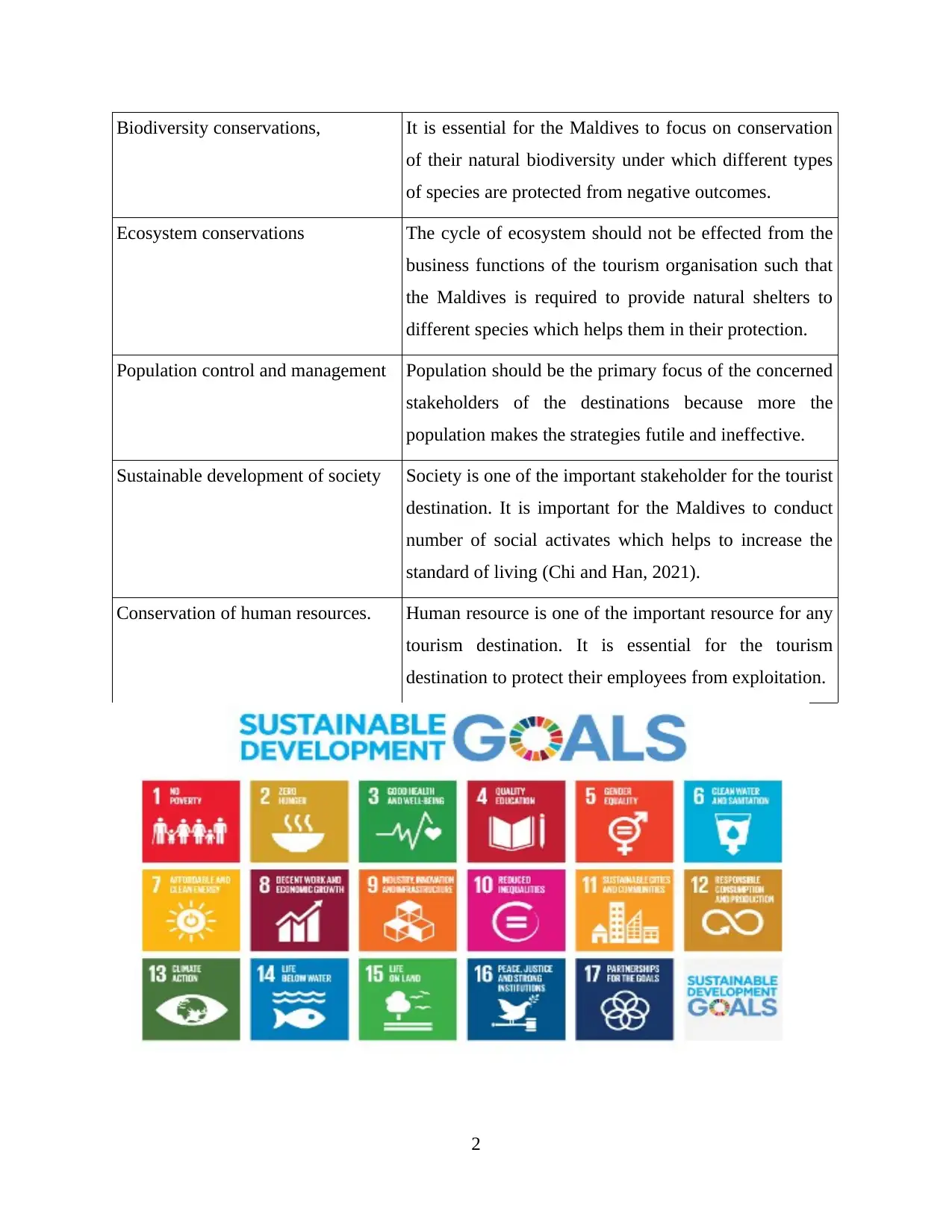
Biodiversity conservations, It is essential for the Maldives to focus on conservation
of their natural biodiversity under which different types
of species are protected from negative outcomes.
Ecosystem conservations The cycle of ecosystem should not be effected from the
business functions of the tourism organisation such that
the Maldives is required to provide natural shelters to
different species which helps them in their protection.
Population control and management Population should be the primary focus of the concerned
stakeholders of the destinations because more the
population makes the strategies futile and ineffective.
Sustainable development of society Society is one of the important stakeholder for the tourist
destination. It is important for the Maldives to conduct
number of social activates which helps to increase the
standard of living (Chi and Han, 2021).
Conservation of human resources. Human resource is one of the important resource for any
tourism destination. It is essential for the tourism
destination to protect their employees from exploitation.
2
of their natural biodiversity under which different types
of species are protected from negative outcomes.
Ecosystem conservations The cycle of ecosystem should not be effected from the
business functions of the tourism organisation such that
the Maldives is required to provide natural shelters to
different species which helps them in their protection.
Population control and management Population should be the primary focus of the concerned
stakeholders of the destinations because more the
population makes the strategies futile and ineffective.
Sustainable development of society Society is one of the important stakeholder for the tourist
destination. It is important for the Maldives to conduct
number of social activates which helps to increase the
standard of living (Chi and Han, 2021).
Conservation of human resources. Human resource is one of the important resource for any
tourism destination. It is essential for the tourism
destination to protect their employees from exploitation.
2
Secure Best Marks with AI Grader
Need help grading? Try our AI Grader for instant feedback on your assignments.
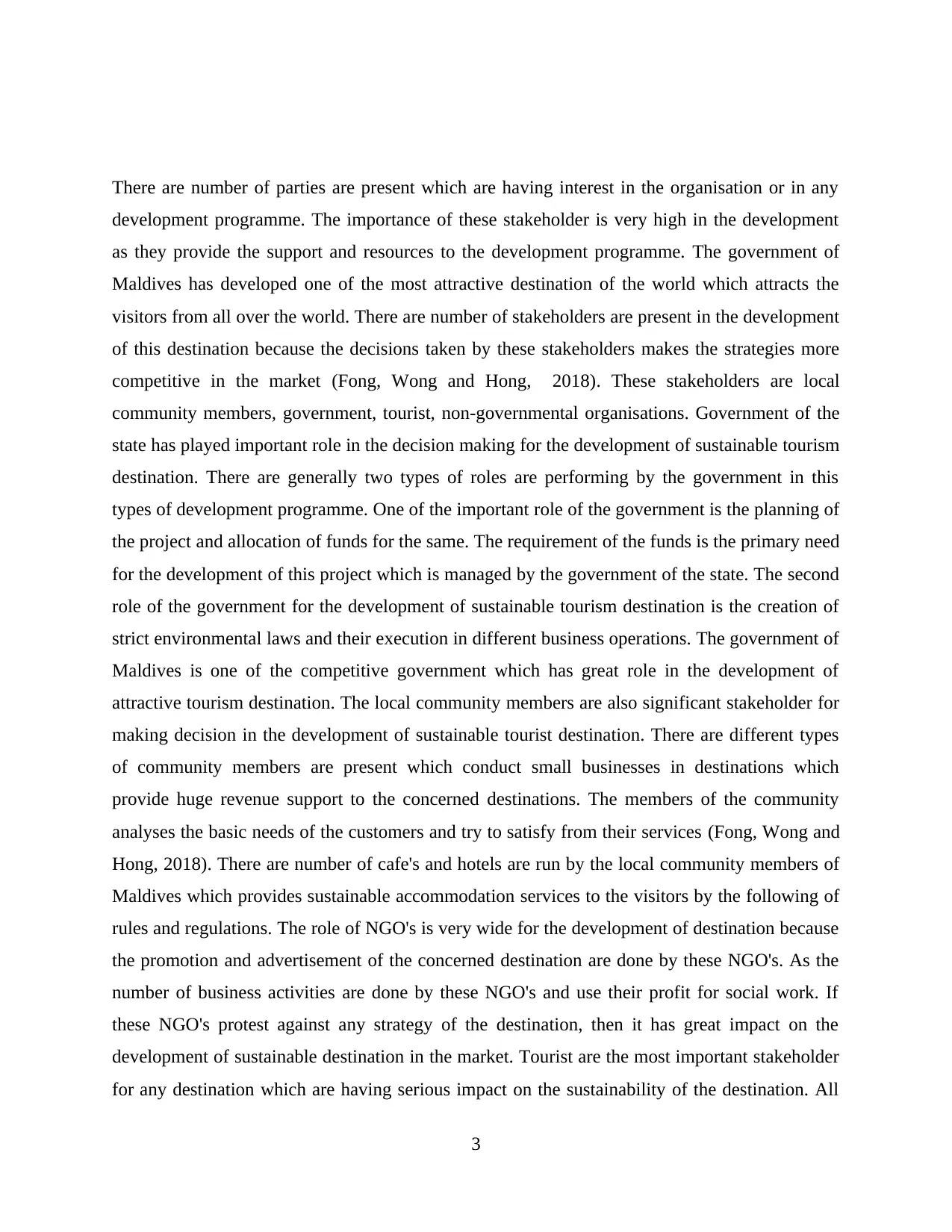
There are number of parties are present which are having interest in the organisation or in any
development programme. The importance of these stakeholder is very high in the development
as they provide the support and resources to the development programme. The government of
Maldives has developed one of the most attractive destination of the world which attracts the
visitors from all over the world. There are number of stakeholders are present in the development
of this destination because the decisions taken by these stakeholders makes the strategies more
competitive in the market (Fong, Wong and Hong, 2018). These stakeholders are local
community members, government, tourist, non-governmental organisations. Government of the
state has played important role in the decision making for the development of sustainable tourism
destination. There are generally two types of roles are performing by the government in this
types of development programme. One of the important role of the government is the planning of
the project and allocation of funds for the same. The requirement of the funds is the primary need
for the development of this project which is managed by the government of the state. The second
role of the government for the development of sustainable tourism destination is the creation of
strict environmental laws and their execution in different business operations. The government of
Maldives is one of the competitive government which has great role in the development of
attractive tourism destination. The local community members are also significant stakeholder for
making decision in the development of sustainable tourist destination. There are different types
of community members are present which conduct small businesses in destinations which
provide huge revenue support to the concerned destinations. The members of the community
analyses the basic needs of the customers and try to satisfy from their services (Fong, Wong and
Hong, 2018). There are number of cafe's and hotels are run by the local community members of
Maldives which provides sustainable accommodation services to the visitors by the following of
rules and regulations. The role of NGO's is very wide for the development of destination because
the promotion and advertisement of the concerned destination are done by these NGO's. As the
number of business activities are done by these NGO's and use their profit for social work. If
these NGO's protest against any strategy of the destination, then it has great impact on the
development of sustainable destination in the market. Tourist are the most important stakeholder
for any destination which are having serious impact on the sustainability of the destination. All
3
development programme. The importance of these stakeholder is very high in the development
as they provide the support and resources to the development programme. The government of
Maldives has developed one of the most attractive destination of the world which attracts the
visitors from all over the world. There are number of stakeholders are present in the development
of this destination because the decisions taken by these stakeholders makes the strategies more
competitive in the market (Fong, Wong and Hong, 2018). These stakeholders are local
community members, government, tourist, non-governmental organisations. Government of the
state has played important role in the decision making for the development of sustainable tourism
destination. There are generally two types of roles are performing by the government in this
types of development programme. One of the important role of the government is the planning of
the project and allocation of funds for the same. The requirement of the funds is the primary need
for the development of this project which is managed by the government of the state. The second
role of the government for the development of sustainable tourism destination is the creation of
strict environmental laws and their execution in different business operations. The government of
Maldives is one of the competitive government which has great role in the development of
attractive tourism destination. The local community members are also significant stakeholder for
making decision in the development of sustainable tourist destination. There are different types
of community members are present which conduct small businesses in destinations which
provide huge revenue support to the concerned destinations. The members of the community
analyses the basic needs of the customers and try to satisfy from their services (Fong, Wong and
Hong, 2018). There are number of cafe's and hotels are run by the local community members of
Maldives which provides sustainable accommodation services to the visitors by the following of
rules and regulations. The role of NGO's is very wide for the development of destination because
the promotion and advertisement of the concerned destination are done by these NGO's. As the
number of business activities are done by these NGO's and use their profit for social work. If
these NGO's protest against any strategy of the destination, then it has great impact on the
development of sustainable destination in the market. Tourist are the most important stakeholder
for any destination which are having serious impact on the sustainability of the destination. All
3
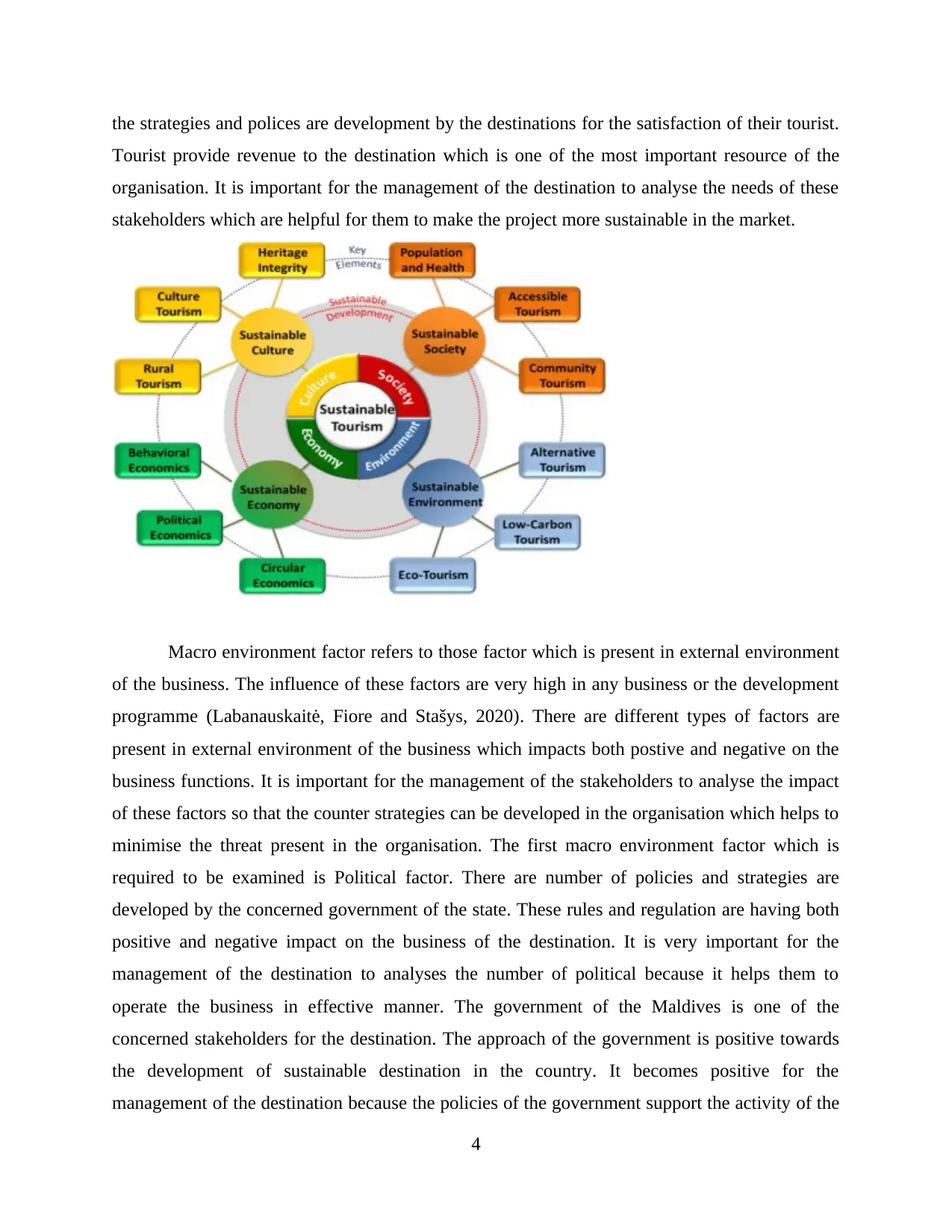
the strategies and polices are development by the destinations for the satisfaction of their tourist.
Tourist provide revenue to the destination which is one of the most important resource of the
organisation. It is important for the management of the destination to analyse the needs of these
stakeholders which are helpful for them to make the project more sustainable in the market.
Macro environment factor refers to those factor which is present in external environment
of the business. The influence of these factors are very high in any business or the development
programme (Labanauskaitė, Fiore and Stašys, 2020). There are different types of factors are
present in external environment of the business which impacts both postive and negative on the
business functions. It is important for the management of the stakeholders to analyse the impact
of these factors so that the counter strategies can be developed in the organisation which helps to
minimise the threat present in the organisation. The first macro environment factor which is
required to be examined is Political factor. There are number of policies and strategies are
developed by the concerned government of the state. These rules and regulation are having both
positive and negative impact on the business of the destination. It is very important for the
management of the destination to analyses the number of political because it helps them to
operate the business in effective manner. The government of the Maldives is one of the
concerned stakeholders for the destination. The approach of the government is positive towards
the development of sustainable destination in the country. It becomes positive for the
management of the destination because the policies of the government support the activity of the
4
Tourist provide revenue to the destination which is one of the most important resource of the
organisation. It is important for the management of the destination to analyse the needs of these
stakeholders which are helpful for them to make the project more sustainable in the market.
Macro environment factor refers to those factor which is present in external environment
of the business. The influence of these factors are very high in any business or the development
programme (Labanauskaitė, Fiore and Stašys, 2020). There are different types of factors are
present in external environment of the business which impacts both postive and negative on the
business functions. It is important for the management of the stakeholders to analyse the impact
of these factors so that the counter strategies can be developed in the organisation which helps to
minimise the threat present in the organisation. The first macro environment factor which is
required to be examined is Political factor. There are number of policies and strategies are
developed by the concerned government of the state. These rules and regulation are having both
positive and negative impact on the business of the destination. It is very important for the
management of the destination to analyses the number of political because it helps them to
operate the business in effective manner. The government of the Maldives is one of the
concerned stakeholders for the destination. The approach of the government is positive towards
the development of sustainable destination in the country. It becomes positive for the
management of the destination because the policies of the government support the activity of the
4
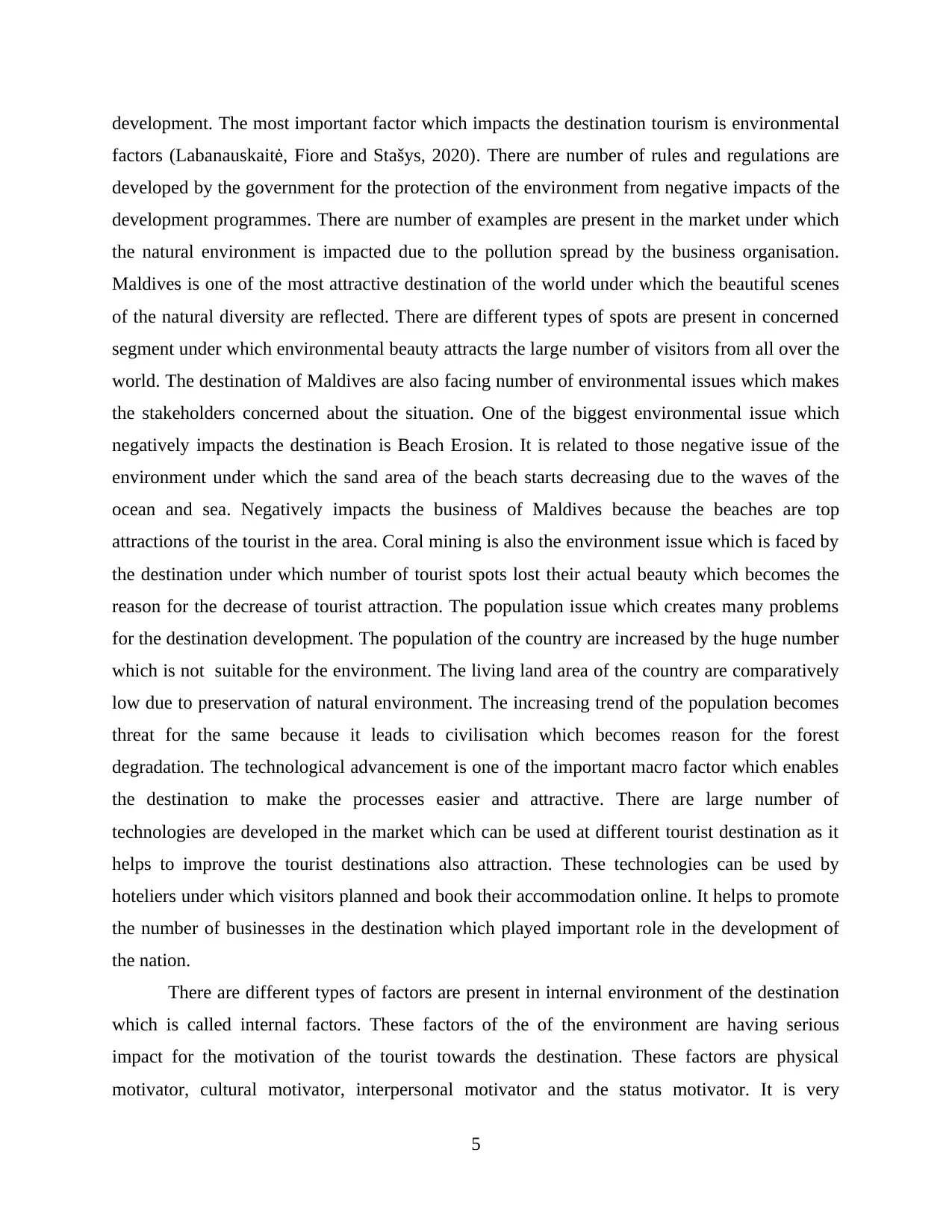
development. The most important factor which impacts the destination tourism is environmental
factors (Labanauskaitė, Fiore and Stašys, 2020). There are number of rules and regulations are
developed by the government for the protection of the environment from negative impacts of the
development programmes. There are number of examples are present in the market under which
the natural environment is impacted due to the pollution spread by the business organisation.
Maldives is one of the most attractive destination of the world under which the beautiful scenes
of the natural diversity are reflected. There are different types of spots are present in concerned
segment under which environmental beauty attracts the large number of visitors from all over the
world. The destination of Maldives are also facing number of environmental issues which makes
the stakeholders concerned about the situation. One of the biggest environmental issue which
negatively impacts the destination is Beach Erosion. It is related to those negative issue of the
environment under which the sand area of the beach starts decreasing due to the waves of the
ocean and sea. Negatively impacts the business of Maldives because the beaches are top
attractions of the tourist in the area. Coral mining is also the environment issue which is faced by
the destination under which number of tourist spots lost their actual beauty which becomes the
reason for the decrease of tourist attraction. The population issue which creates many problems
for the destination development. The population of the country are increased by the huge number
which is not suitable for the environment. The living land area of the country are comparatively
low due to preservation of natural environment. The increasing trend of the population becomes
threat for the same because it leads to civilisation which becomes reason for the forest
degradation. The technological advancement is one of the important macro factor which enables
the destination to make the processes easier and attractive. There are large number of
technologies are developed in the market which can be used at different tourist destination as it
helps to improve the tourist destinations also attraction. These technologies can be used by
hoteliers under which visitors planned and book their accommodation online. It helps to promote
the number of businesses in the destination which played important role in the development of
the nation.
There are different types of factors are present in internal environment of the destination
which is called internal factors. These factors of the of the environment are having serious
impact for the motivation of the tourist towards the destination. These factors are physical
motivator, cultural motivator, interpersonal motivator and the status motivator. It is very
5
factors (Labanauskaitė, Fiore and Stašys, 2020). There are number of rules and regulations are
developed by the government for the protection of the environment from negative impacts of the
development programmes. There are number of examples are present in the market under which
the natural environment is impacted due to the pollution spread by the business organisation.
Maldives is one of the most attractive destination of the world under which the beautiful scenes
of the natural diversity are reflected. There are different types of spots are present in concerned
segment under which environmental beauty attracts the large number of visitors from all over the
world. The destination of Maldives are also facing number of environmental issues which makes
the stakeholders concerned about the situation. One of the biggest environmental issue which
negatively impacts the destination is Beach Erosion. It is related to those negative issue of the
environment under which the sand area of the beach starts decreasing due to the waves of the
ocean and sea. Negatively impacts the business of Maldives because the beaches are top
attractions of the tourist in the area. Coral mining is also the environment issue which is faced by
the destination under which number of tourist spots lost their actual beauty which becomes the
reason for the decrease of tourist attraction. The population issue which creates many problems
for the destination development. The population of the country are increased by the huge number
which is not suitable for the environment. The living land area of the country are comparatively
low due to preservation of natural environment. The increasing trend of the population becomes
threat for the same because it leads to civilisation which becomes reason for the forest
degradation. The technological advancement is one of the important macro factor which enables
the destination to make the processes easier and attractive. There are large number of
technologies are developed in the market which can be used at different tourist destination as it
helps to improve the tourist destinations also attraction. These technologies can be used by
hoteliers under which visitors planned and book their accommodation online. It helps to promote
the number of businesses in the destination which played important role in the development of
the nation.
There are different types of factors are present in internal environment of the destination
which is called internal factors. These factors of the of the environment are having serious
impact for the motivation of the tourist towards the destination. These factors are physical
motivator, cultural motivator, interpersonal motivator and the status motivator. It is very
5
Paraphrase This Document
Need a fresh take? Get an instant paraphrase of this document with our AI Paraphraser
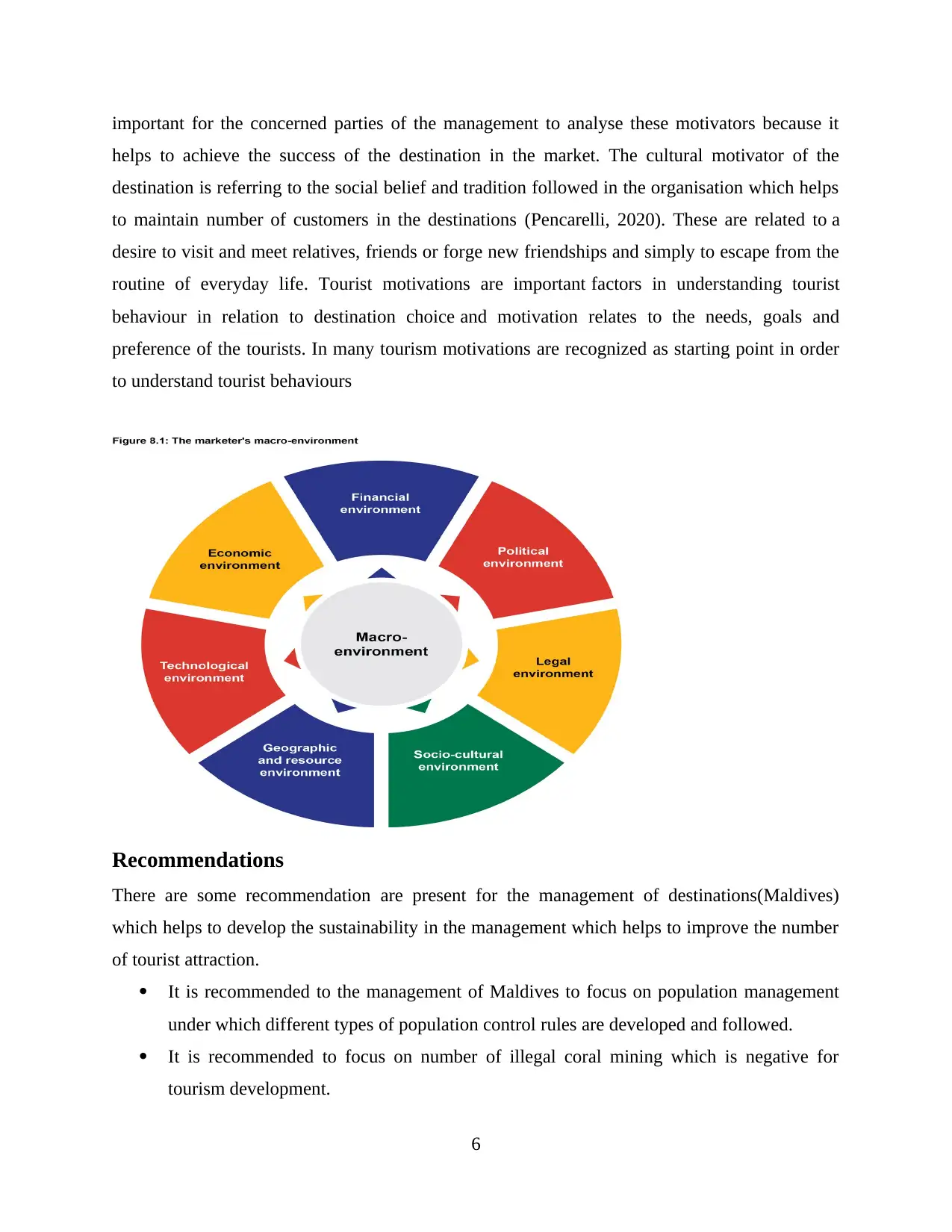
important for the concerned parties of the management to analyse these motivators because it
helps to achieve the success of the destination in the market. The cultural motivator of the
destination is referring to the social belief and tradition followed in the organisation which helps
to maintain number of customers in the destinations (Pencarelli, 2020). These are related to a
desire to visit and meet relatives, friends or forge new friendships and simply to escape from the
routine of everyday life. Tourist motivations are important factors in understanding tourist
behaviour in relation to destination choice and motivation relates to the needs, goals and
preference of the tourists. In many tourism motivations are recognized as starting point in order
to understand tourist behaviours
Recommendations
There are some recommendation are present for the management of destinations(Maldives)
which helps to develop the sustainability in the management which helps to improve the number
of tourist attraction.
It is recommended to the management of Maldives to focus on population management
under which different types of population control rules are developed and followed.
It is recommended to focus on number of illegal coral mining which is negative for
tourism development.
6
helps to achieve the success of the destination in the market. The cultural motivator of the
destination is referring to the social belief and tradition followed in the organisation which helps
to maintain number of customers in the destinations (Pencarelli, 2020). These are related to a
desire to visit and meet relatives, friends or forge new friendships and simply to escape from the
routine of everyday life. Tourist motivations are important factors in understanding tourist
behaviour in relation to destination choice and motivation relates to the needs, goals and
preference of the tourists. In many tourism motivations are recognized as starting point in order
to understand tourist behaviours
Recommendations
There are some recommendation are present for the management of destinations(Maldives)
which helps to develop the sustainability in the management which helps to improve the number
of tourist attraction.
It is recommended to the management of Maldives to focus on population management
under which different types of population control rules are developed and followed.
It is recommended to focus on number of illegal coral mining which is negative for
tourism development.
6
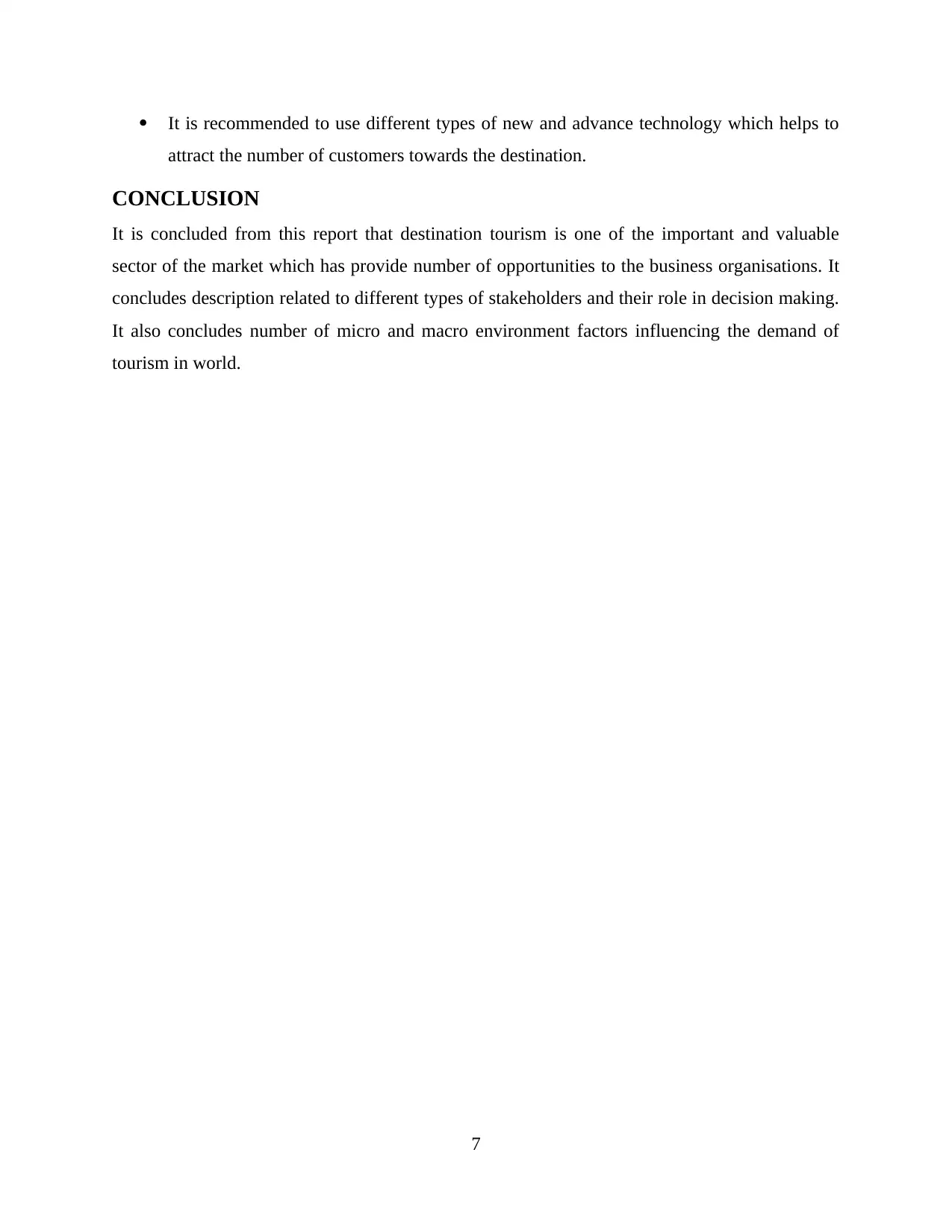
It is recommended to use different types of new and advance technology which helps to
attract the number of customers towards the destination.
CONCLUSION
It is concluded from this report that destination tourism is one of the important and valuable
sector of the market which has provide number of opportunities to the business organisations. It
concludes description related to different types of stakeholders and their role in decision making.
It also concludes number of micro and macro environment factors influencing the demand of
tourism in world.
7
attract the number of customers towards the destination.
CONCLUSION
It is concluded from this report that destination tourism is one of the important and valuable
sector of the market which has provide number of opportunities to the business organisations. It
concludes description related to different types of stakeholders and their role in decision making.
It also concludes number of micro and macro environment factors influencing the demand of
tourism in world.
7
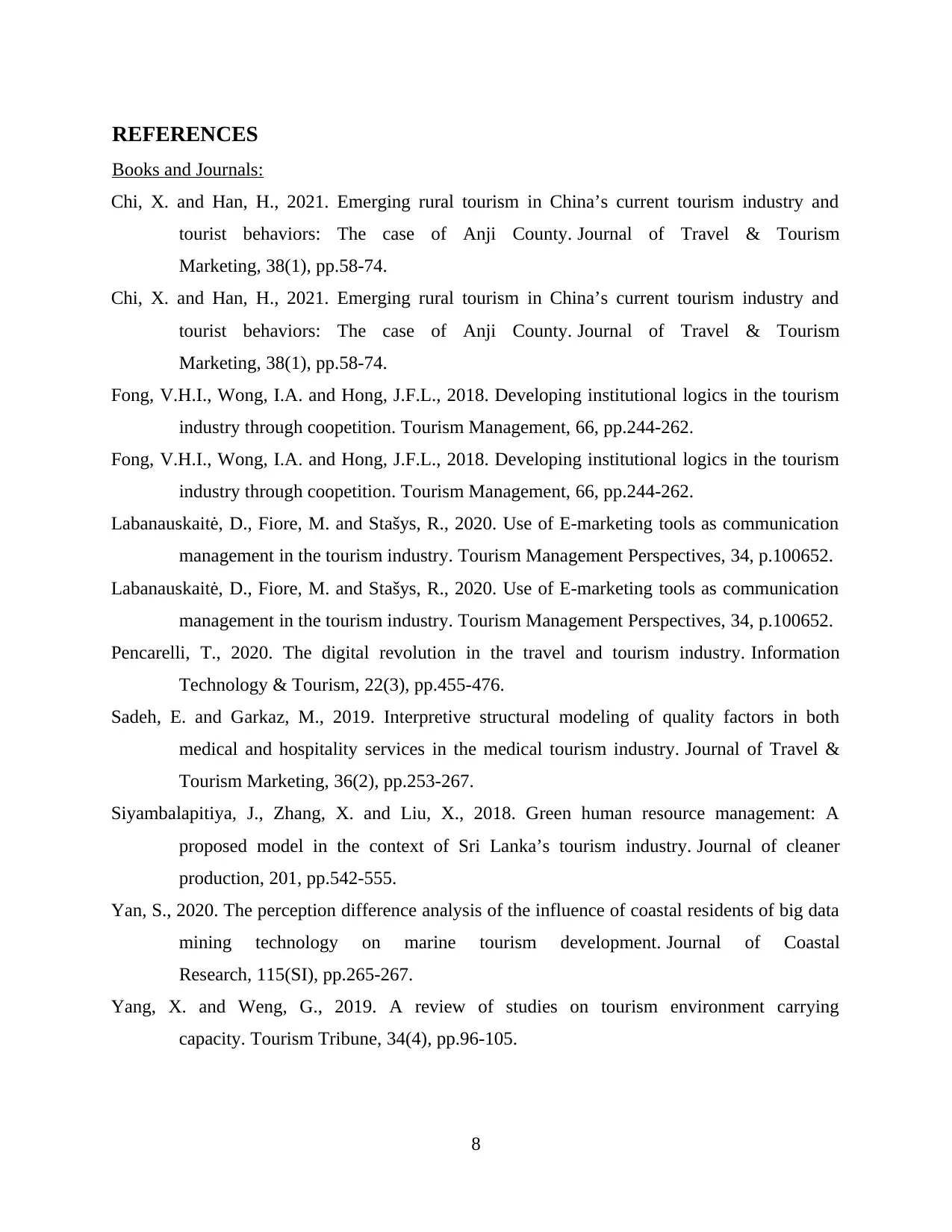
REFERENCES
Books and Journals:
Chi, X. and Han, H., 2021. Emerging rural tourism in China’s current tourism industry and
tourist behaviors: The case of Anji County. Journal of Travel & Tourism
Marketing, 38(1), pp.58-74.
Chi, X. and Han, H., 2021. Emerging rural tourism in China’s current tourism industry and
tourist behaviors: The case of Anji County. Journal of Travel & Tourism
Marketing, 38(1), pp.58-74.
Fong, V.H.I., Wong, I.A. and Hong, J.F.L., 2018. Developing institutional logics in the tourism
industry through coopetition. Tourism Management, 66, pp.244-262.
Fong, V.H.I., Wong, I.A. and Hong, J.F.L., 2018. Developing institutional logics in the tourism
industry through coopetition. Tourism Management, 66, pp.244-262.
Labanauskaitė, D., Fiore, M. and Stašys, R., 2020. Use of E-marketing tools as communication
management in the tourism industry. Tourism Management Perspectives, 34, p.100652.
Labanauskaitė, D., Fiore, M. and Stašys, R., 2020. Use of E-marketing tools as communication
management in the tourism industry. Tourism Management Perspectives, 34, p.100652.
Pencarelli, T., 2020. The digital revolution in the travel and tourism industry. Information
Technology & Tourism, 22(3), pp.455-476.
Sadeh, E. and Garkaz, M., 2019. Interpretive structural modeling of quality factors in both
medical and hospitality services in the medical tourism industry. Journal of Travel &
Tourism Marketing, 36(2), pp.253-267.
Siyambalapitiya, J., Zhang, X. and Liu, X., 2018. Green human resource management: A
proposed model in the context of Sri Lanka’s tourism industry. Journal of cleaner
production, 201, pp.542-555.
Yan, S., 2020. The perception difference analysis of the influence of coastal residents of big data
mining technology on marine tourism development. Journal of Coastal
Research, 115(SI), pp.265-267.
Yang, X. and Weng, G., 2019. A review of studies on tourism environment carrying
capacity. Tourism Tribune, 34(4), pp.96-105.
8
Books and Journals:
Chi, X. and Han, H., 2021. Emerging rural tourism in China’s current tourism industry and
tourist behaviors: The case of Anji County. Journal of Travel & Tourism
Marketing, 38(1), pp.58-74.
Chi, X. and Han, H., 2021. Emerging rural tourism in China’s current tourism industry and
tourist behaviors: The case of Anji County. Journal of Travel & Tourism
Marketing, 38(1), pp.58-74.
Fong, V.H.I., Wong, I.A. and Hong, J.F.L., 2018. Developing institutional logics in the tourism
industry through coopetition. Tourism Management, 66, pp.244-262.
Fong, V.H.I., Wong, I.A. and Hong, J.F.L., 2018. Developing institutional logics in the tourism
industry through coopetition. Tourism Management, 66, pp.244-262.
Labanauskaitė, D., Fiore, M. and Stašys, R., 2020. Use of E-marketing tools as communication
management in the tourism industry. Tourism Management Perspectives, 34, p.100652.
Labanauskaitė, D., Fiore, M. and Stašys, R., 2020. Use of E-marketing tools as communication
management in the tourism industry. Tourism Management Perspectives, 34, p.100652.
Pencarelli, T., 2020. The digital revolution in the travel and tourism industry. Information
Technology & Tourism, 22(3), pp.455-476.
Sadeh, E. and Garkaz, M., 2019. Interpretive structural modeling of quality factors in both
medical and hospitality services in the medical tourism industry. Journal of Travel &
Tourism Marketing, 36(2), pp.253-267.
Siyambalapitiya, J., Zhang, X. and Liu, X., 2018. Green human resource management: A
proposed model in the context of Sri Lanka’s tourism industry. Journal of cleaner
production, 201, pp.542-555.
Yan, S., 2020. The perception difference analysis of the influence of coastal residents of big data
mining technology on marine tourism development. Journal of Coastal
Research, 115(SI), pp.265-267.
Yang, X. and Weng, G., 2019. A review of studies on tourism environment carrying
capacity. Tourism Tribune, 34(4), pp.96-105.
8
Secure Best Marks with AI Grader
Need help grading? Try our AI Grader for instant feedback on your assignments.
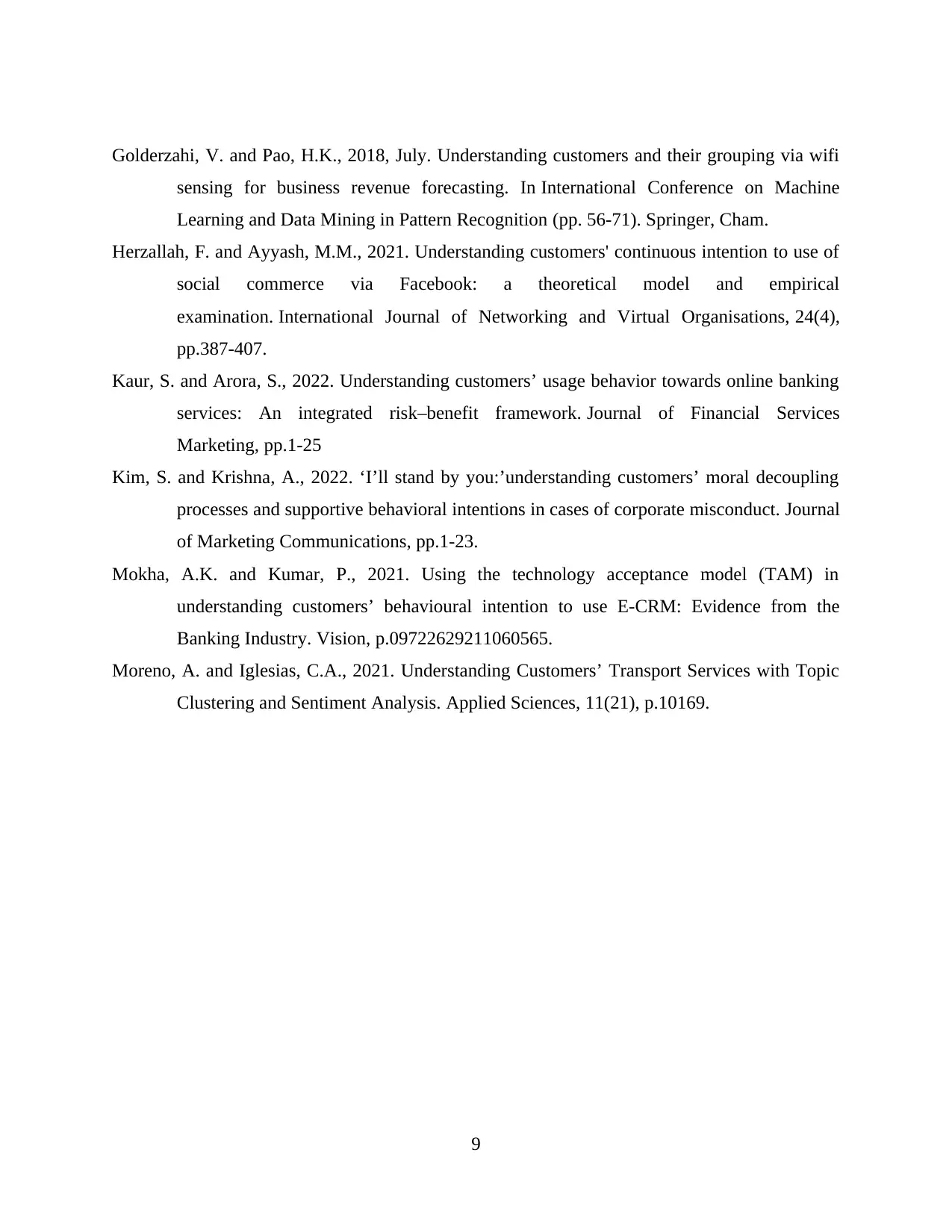
Golderzahi, V. and Pao, H.K., 2018, July. Understanding customers and their grouping via wifi
sensing for business revenue forecasting. In International Conference on Machine
Learning and Data Mining in Pattern Recognition (pp. 56-71). Springer, Cham.
Herzallah, F. and Ayyash, M.M., 2021. Understanding customers' continuous intention to use of
social commerce via Facebook: a theoretical model and empirical
examination. International Journal of Networking and Virtual Organisations, 24(4),
pp.387-407.
Kaur, S. and Arora, S., 2022. Understanding customers’ usage behavior towards online banking
services: An integrated risk–benefit framework. Journal of Financial Services
Marketing, pp.1-25
Kim, S. and Krishna, A., 2022. ‘I’ll stand by you:’understanding customers’ moral decoupling
processes and supportive behavioral intentions in cases of corporate misconduct. Journal
of Marketing Communications, pp.1-23.
Mokha, A.K. and Kumar, P., 2021. Using the technology acceptance model (TAM) in
understanding customers’ behavioural intention to use E-CRM: Evidence from the
Banking Industry. Vision, p.09722629211060565.
Moreno, A. and Iglesias, C.A., 2021. Understanding Customers’ Transport Services with Topic
Clustering and Sentiment Analysis. Applied Sciences, 11(21), p.10169.
9
sensing for business revenue forecasting. In International Conference on Machine
Learning and Data Mining in Pattern Recognition (pp. 56-71). Springer, Cham.
Herzallah, F. and Ayyash, M.M., 2021. Understanding customers' continuous intention to use of
social commerce via Facebook: a theoretical model and empirical
examination. International Journal of Networking and Virtual Organisations, 24(4),
pp.387-407.
Kaur, S. and Arora, S., 2022. Understanding customers’ usage behavior towards online banking
services: An integrated risk–benefit framework. Journal of Financial Services
Marketing, pp.1-25
Kim, S. and Krishna, A., 2022. ‘I’ll stand by you:’understanding customers’ moral decoupling
processes and supportive behavioral intentions in cases of corporate misconduct. Journal
of Marketing Communications, pp.1-23.
Mokha, A.K. and Kumar, P., 2021. Using the technology acceptance model (TAM) in
understanding customers’ behavioural intention to use E-CRM: Evidence from the
Banking Industry. Vision, p.09722629211060565.
Moreno, A. and Iglesias, C.A., 2021. Understanding Customers’ Transport Services with Topic
Clustering and Sentiment Analysis. Applied Sciences, 11(21), p.10169.
9
1 out of 11
Related Documents
Your All-in-One AI-Powered Toolkit for Academic Success.
+13062052269
info@desklib.com
Available 24*7 on WhatsApp / Email
![[object Object]](/_next/static/media/star-bottom.7253800d.svg)
Unlock your academic potential
© 2024 | Zucol Services PVT LTD | All rights reserved.





